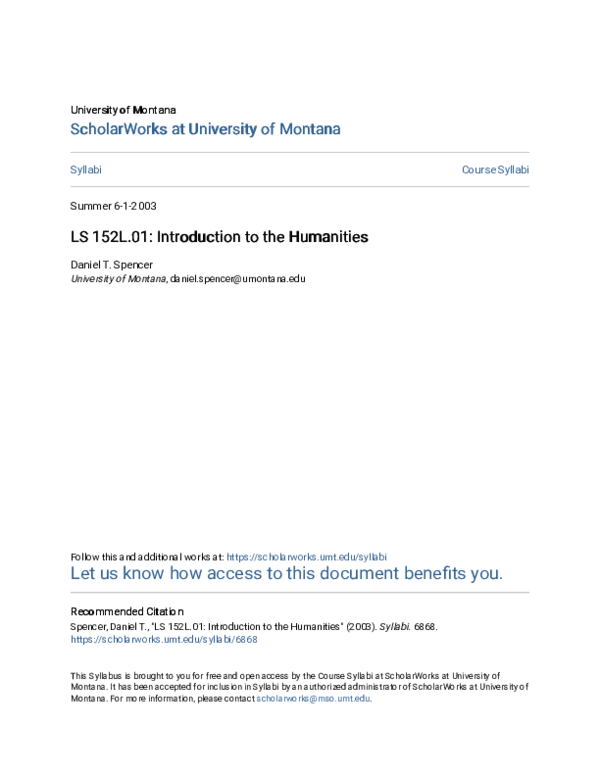Academia.edu no longer supports Internet Explorer.
To browse Academia.edu and the wider internet faster and more securely, please take a few seconds to upgrade your browser.
LS 152L.01: Introduction to the Humanities
Related Papers
2009 •
This volume assembles 15 essays, which reflect on the diverse and changing ways in which themes and phenomena of classi- cal antiquity were, have been, or should be, integrated into areas beyond Classics: in the study of political phenomena such as modern democracy and European integration; in the critical assessment of a historical period such as the Ancien Régime in France; in the shaping of a civil society in Germany at the time of the Enlightenment and in the formative phase of the United States; in the process of state formation in modern Greece and nineteenth-century Germany; in times of war and crisis; in education, science, or popular culture.
Humanities
Classen.Key Issues.Humanities.2020 •
There are available by now many arguments concerning the intrinsic and endemic value of the humanities, and both from a medievalist and a modernist perspective. Similarly, there continue to be many critics who would not mind the elimination of the humanities and argue vociferously for this goal. Every critical investigation of how to defend our field thus proves to be highly valuable, but we in the humanities must also develop specific points concerning the importance of our research that will convince both students, parents, administrators, and politicians in concrete, pragmatic terms regarding the supreme relevance of college education. Fortunately, the current COVID-19 crisis has also profiled in a dramatic fashion what proves to be of fundamental importance for human life, both past and present, reminding us of the critical importance of the humanities. An existence without virtues, a completely narcissistic or egoistical concept of life, or a society entirely predicated on materialistic interests would cut us off from our own future. This article discusses several literary works and also a modern movie in which the constant quest for meaning and relevance in our lives comes to the fore and gives us direction and understanding.
____________________________________________ In our last installment of The New Adventures of Old Literature, we left Italo Calvino (1999), an Italian author and literary critic, dangling on the edge of his own question, Why read the classics? In that column, we vacillated between Calvino's reasons to read the classics and sociocultural theories of new literacies in order to grapple with frequently asked educational questions such as What makes a classic a classic?, What makes new literacies new?, and How can I teach great literature in ways that resonate with the students in my classes today? In that column, we extended Calvino's question of Why read the classics? to Why teach the classics?, and we looked at issues of power, identity politics, and self-representation. This time on The New Adventures of Old Literature, I bring into question whether a classic needs to be "old" in the first place. In answering this question, I consider what would make a "modern ...
This article discusses the importance, relevance and viability of Classics and the Humanities in the university setting of the twenty-first century, including in Nigeria. It gives an overview of the opportunities and challenges facing researchers, lecturers and students in Classics and the Humanities in the new millennium. In the process this presentation hopes to provide a sense of the broad scope and relevance of Classics to humanistic thinking and the modern world.
RELATED PAPERS
2024 •
Giornate Europee dell’Archeologia
CONFERENCES | Le navi di Nemi. Luoghi e memorie al futuro [Nemi, 14 June 2024, h. 10]2024 •
2021 •
Vietnamese Journal of Radiology and Nuclear Medicine
Sinh Thiết Qua Da Đường Nội Mạch Kết Hợp Can Thiệp Điều Trị Một Trường Hợp Hội Chứng Tĩnh Mạch Chủ Trên Báo Cáo Trường Hợp Lâm SàngCulture, Medicine, and Psychiatry
Mental Health Collaborative Care in Brazil and the Economy of Attention: Disclosing Barriers and Therapeutic Negotiations2024 •
Crossing the Border: International Journal of Interdisciplinary Studies
Impacts of Climate Change on the Livelihoods of Local People: A Case from Jethal V.D.C., Sindhupal-Chowk District2014 •
Journal of Medical Microbiology
Quantitative real-time PCR analysis of Mycobacterium leprae DNA and mRNA in human biopsy material from leprosy and reactional cases2009 •
2024 •
International Journal of Advanced Engineering, Management and Science
OPEN ACCESS | JOURNAL ARTICLE Determining the MOV Element Number of Surge Protective Device, Manufactured by Multi-Block MOV Technology2020 •
Experimental Gerontology
Multiple roles of FOXO transcription factors in mammalian cells point to multiple roles in cancer2006 •
RELATED TOPICS
- Find new research papers in:
- Physics
- Chemistry
- Biology
- Health Sciences
- Ecology
- Earth Sciences
- Cognitive Science
- Mathematics
- Computer Science

 Paul A . Dietrich
Paul A . Dietrich